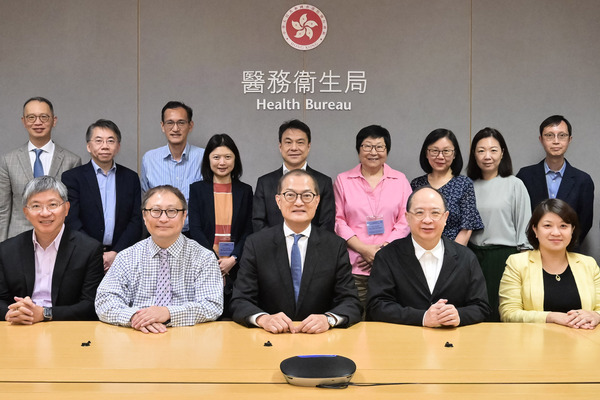Cancer strategies discussed

Secretary for Health Prof Lo Chung-mau (front row, centre) chairs the 19th Cancer Coordinating Committee meeting.
Secretary for Health Prof Lo Chung-mau chaired the 19th meeting of the Cancer Coordinating Committee today to review the implementation of the Hong Kong Cancer Strategy and discuss response measures with relevant government departments and organisations.
The Hong Kong Cancer Strategy, the city’s first holistic plan formulated for cancer prevention and control, sets out strategies for cancer prevention and treatment for the period between 2020 and 2025.
At the meeting, the committee reviewed the citywide population-based cancer data for 2021 as well as various cancer surveillance indicators such as incidence, mortality and survival rates of major cancers.
A total of 38,462 newly diagnosed cancer cases were recorded in Hong Kong in 2021, involving 18,943 men and 19,519 women. In other words, 105 people were diagnosed with cancer every day on average.
Lung cancer and breast cancer were the most commonly diagnosed cancers among men and women respectively.
Prof Lo said: “The overall survival rate for cancer patients in Hong Kong has increased steadily over the past two decades. As shown by the stage-specific survival rates of multiple cancers, the survival rate will be much higher if a patient has the cancer detected at an early stage followed by early treatment.
“Most patients with early-stage cancers have a five-year relative survival rate reaching 90% or higher. Among them, the ratio of surviving for more than five years for those with certain early-stage cancers is comparable to that of the general population.”
The well-established local cancer database not only provides reliable data for cancer surveillance, but also serves as an important resource for the Government and stakeholders to formulate cancer prevention and control strategies as well as drive healthcare development, he added.
The health chief also noted that primary prevention, ie reducing exposure to cancer risk factors, is a vital strategy for reducing the risk of developing cancer.
“The Government has long been adopting a multipronged approach, including publicity, education, promotion, legislation and regulation, to encourage citizens to live a healthy lifestyle, such as a healthy diet, regular physical activities and maintenance of a healthy body weight and waist circumference as well as avoidance of smoking and alcohol, to reduce the risks of contracting non-communicable diseases including cancer.”
Various cancer prevention and control measures, including surveillance, prevention and screening, diagnosis, treatment and survivorship care, and research, were also discussed at today’s meeting.